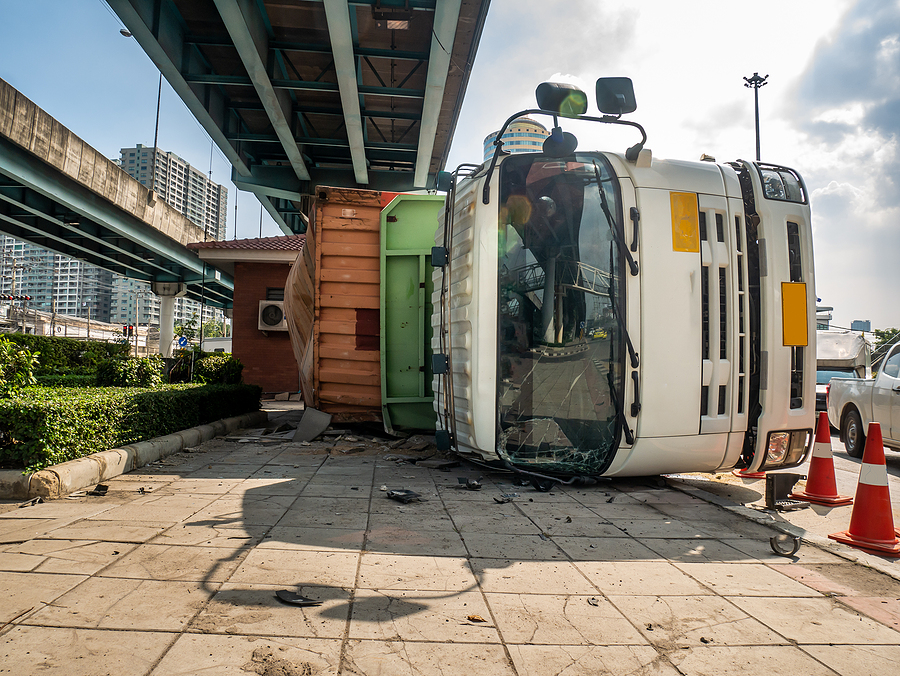When a tractor-trailer overturns, it presents an immediate danger for anyone nearby. As a truck begins to roll, it causes substantial damage to vehicles in its path. Even an empty tractor-trailer or tanker has enough weight to crush a smaller vehicle and injure its occupants. Cargo simply increases the potential for serious or fatal harm.
Rollover accidents often involve the truck only, and they frequently endanger the trucker’s life. Drivers and transport companies also suffer financial consequences when a driver damages or loses their customer’s cargo on the highway,
Like most trucker accidents, rollovers are largely preventable. They occur when a series of adverse circumstances align. Prevention requires that drivers avoid the common behaviors and circumstances that often contribute to other truck accidents.
If you sustained injuries in a truck rollover accident, you need legal assistance from a truck accident attorney near you.
Rollover Accidents Occur Every Day
The Federal Motor Carrier Safety Administration (FMCSA) documents, researches, and analyzes large truck rollover accidents nationwide. Rollover accidents involve all large trucks, but such accidents affect tanker trucks more frequently.
The FMCSA’s safety efforts focus on tankers for two primary reasons:
- Tanker trucks often haul hazardous liquids.
- Rollovers involving hazardous liquid spills often present community-wide dangers.
The National Highway Transportation Safety Administration’s Annual Report Tables document large truck rollover accidents by severity and vehicle type.
Of the total large truck crashes nationwide, 3.2 percent involved rollovers. Consider the following accident statistics:
- Total large truck crashes: 538,000
- Total rollover crashes: 17,000 (3.2 percent)
Fatal Rollover Crashes
- Single unit truck: 267 crashes
- Combination truck: 340
Rollover Crashes With Injuries
- Single unit truck: 4,000 crashes
- Combination truck: 4,000 crashes
Why Rollover Accidents Occur
When a rollover accident occurs, truckers can easily try to blame the truck, the road, or weather conditions. These issues contribute to accidents, but they don’t usually constitute the primary cause. In most accidents, driver action or inaction contributes to a rollover. The safety fact sheet, Keep Your Load on the Road, and other FMCSA safety resources explain the reasons behind these dangerous accidents, which we discuss in further detail below.
The Driver
Rollover accidents happen for the usual reasons. A trucker may drive while distracted, under the influence of drugs or alcohol, speeding, or fatigued. Rollovers often occur as a complication of these and other situations within the driver’s control.
Below, we provide a few examples:
- Complacency: Seasoned truckers sometimes take their experience for granted. They may not pay as much attention as they should to driving and road conditions. Drivers often become distracted, so they can’t respond quickly enough when danger presents itself.
- Attempted Course Corrections: Rollovers often occur when a driver attempts to correct a previous action: a wrong or narrow turn, running a tire onto a soft shoulder, or suddenly slowing down.
- Speed: FMCSA reminds truckers that posted speed limits should guide private passenger vehicles, and only when conditions prove favorable. FMCSA research determined that only 28 percent of rollover cases involved traveling too fast for conditions. Sudden acceleration and sudden braking constitute more frequent speed-related issues. Speed also contributes to accidents when truckers fail to adjust their speed before navigating a long, downhill grade.
- Inspection and Maintenance: Truckers must maintain a pre-trip inspection routine. This allows them to discover any maintenance, mechanical, or tire issues that need attention. A trucker should never take a truck on the road if a maintenance problem exists.
The Vehicle
Commercial vehicles have inherent design and maintenance issues that sometimes contribute to rollover accidents.
Consider a truck’s:
- Center of Gravity: Tanker trucks have a high center of gravity relative to their widths. This makes them less stable and throws them off balance in certain situations. When a tank leans even slightly, its liquid cargo sloshes sideways. This sudden shift sometimes causes a rollover.
- Cargo Securement: When a trucker or loading company fails to secure a dry load, it creates an unsafe situation that can result in a rollover accident. Federal transportation law mandates proper cargo securement. Truckers have online access to securement guidelines and procedural handbooks.
- Partial Loads: In sixty-three percent of tanker rollovers, the tank contains only a partial load. Partial loads allow more liquid sloshes and surges that contribute to tanker instability. Tractor-trailer rigs have similar cargo shifting issues. As truckers can’t always avoid hauling partial loads, truckers must understand the difficulties and drive accordingly. Loaders must properly block, stabilize, and secure partial loads in trailers and on flatbeds. All truckers must drive carefully to avoid load shifts and liquid sloshes during sudden turns and maneuvers.
- Brake Performance: Brake defects play a role in 54 percent of vehicle rollovers. When brakes need an adjustment, they don’t always respond appropriately. This can present a critical issue before and during downhill travel or when a trucker confronts a sudden hazard.
- Tires Maintenance: Faulty or worn tires sometimes cause or contribute to accidents. The U.S. Department of Transportation publishes Commercial Tire Safety Tips. These simple references inform drivers about tire issues and how they contribute to commercial vehicle accidents. Truckers must remain mindful of cargo overload, tire under inflation, excessive tread wear, cuts, and damage. Drivers must also know and comply with tire speed ratings. Improper tire use and maintenance increase the risk of premature tire failure.
The Road
While rollover accidents do occur on curves and exit ramps, these don’t constitute the primary locations. Over half of rollover accidents occur on straight stretches of highway.
Truckers don’t drive as cautiously in these areas because they seem easier to navigate. When maneuvering a curved roadway or exit ramp, truckers usually recognize the danger and take corrective actions. The FMCSA recommends that drivers research their trips before leaving.
Familiarity allows truckers to avoid hazardous roads by choosing an alternate route.
- Curbs: The FMCSA recommends a three to four-foot clearance between a truck’s tires and the curb. When a driver travels too close to a curb, it sometimes disrupts the trucker’s intended action and causes a rollover. Accidents also occur when a driver attempts to correct an action.
- Berm/Soft Shoulder: When a truck accidentally enters a soft shoulder or berm, it often causes balance issues, load shifting, and subsequent rollovers. In responding to the change in the road surface, truckers often make the situation worse by overcorrecting, braking suddenly, and moving too quickly.
- Steep Downhill Grades: Speed may present an issue when a trucker makes sudden decisions while driving downhill. Truckers must plan downshifting and braking before entering a downgrade.
- Low-Visibility Areas: Truckers have visibility issues when they encounter trees, hills, buildings, sharp curves, and other features that obstruct the view. Low visibility issues often lead to sudden stopping, slowing, maneuvering, and other driver actions that cause load shifts and liquid surges.
- Narrow Driveways: When truckers encounter a narrow paved area, they can’t always avoid curbs, soft shoulders, and other road features that contribute to rollovers.
Truck Rollover Injury Attorneys
If you sustained injuries in a truck rollover accident, you need legal assistance from a truck accident attorney near you. When you manage your own injury claim, you deal with truckers, transport companies, their insurance claim investigators, and sometimes their legal representatives. Personal injury attorneys manage these complex interactions on your behalf and work to produce the best results possible.
Most truck accident attorneys offer free initial consultations, and you don’t have to commit to filing a claim or lawsuit. During your consultation, you can discuss your accident with an attorney and learn more about your legal options.
Contact a Skilled Attorney Today
Our skilled personal injury lawyers are ready to help you pursue monetary compensation in your truck accident claim. To schedule a free case evaluation and legal consultation with a Brownsville truck accident attorney, please call us at (956) 544-9292 or contact us online today for more information.


